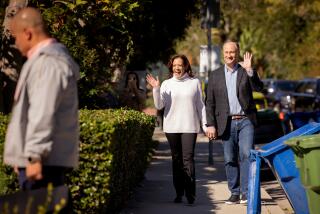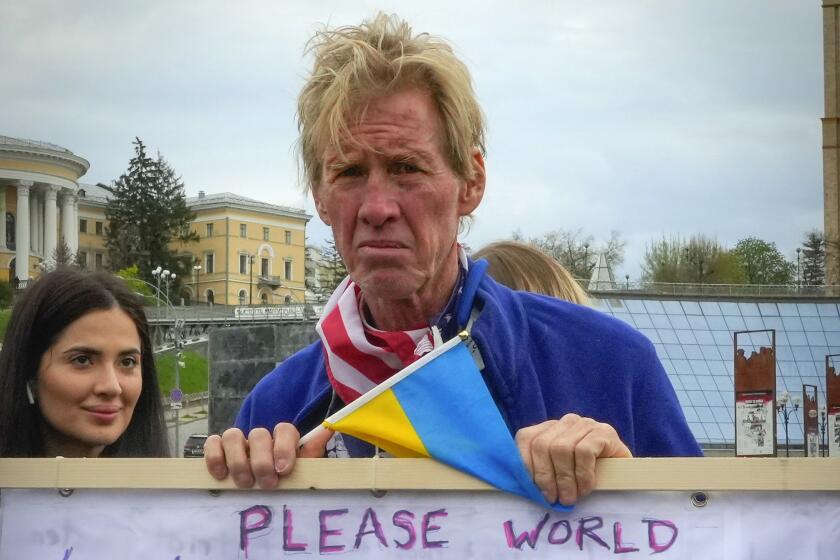Hurricane Sandy blows away campaign plans
WASHINGTON — For months, the two presidential campaigns have been bracing for an October surprise, and it finally arrived in the form of rain, wind and snow curled like a fist 1,000 miles wide.
There has never been anything like it in modern American history, a natural disaster so massive and so close to election day, and for all their minutely-plotted moves there was nothing for the candidates and their strategists to do but improvise and hope for the best.
President Obama scrapped a campaign appearance in Orlando, Fla., and hurried back to Washington to oversee the emergency response to Hurricane Sandy. Speaking to reporters at the White House, he brushed aside questions about the political implications.
“I’m not worried, at this point, about the impact on the election,” he said. “I’m worried about the impact on families. I’m worried about the impact on our first responders. I’m worried about the impact on our economy and on transportation. The election will take care of itself next week.”
His Republican challenger, Mitt Romney, sought a balance between political imperative and concern for others. Campaigning in northeastern Ohio, he said a win in that Midwestern battleground state would ensure victory next Tuesday.
“We’re counting on Ohio,” he said in a stop outside Cleveland. But so are others, he said, urging supporters to donate to the Red Cross or find other ways to give. “The people in Ohio have big hearts, so we’re expecting you to follow through and help out,” he said before moving on to a stop in Iowa.
Obama abandoned his campaign schedule for Tuesday and may do so beyond that. Romney planned a “storm relief event” in Kettering, Ohio, where he earlier advertised a campaign stop. Both suspended fundraising emails in a broad area affected by the storm.
But their TV ads blazed on, creating a jarring juxtaposition as the heat of the campaign butted against the sober warnings of emergency officials and scenes of flooding and other damage from Hurricane Sandy.
“In what was already becoming perhaps the most unpredictable election we’ve had in a generation, this adds one more level of unpredictability,” said Paul Maslin, a Democratic pollster in Wisconsin, another of the home-stretch battlegrounds.
History suggests a few things. Fairly or not, Obama was treading the highest wire, since he is the face of Washington’s response. He will be measured over the next week in a way he has not been up to now.
“If you make a promise on the campaign trail and don’t keep it, voters may or may not remember,” said Dan Schnur, a USC political analyst who helped former California Gov. Pete Wilson raise his political stock by navigating a series of natural disasters. “But when they’re struggling with the basic necessities of life, an elected official can be either a hero or a villain, depending on how well they respond.”
The judgment may be all the more acute coming at the very moment many voters prepare to cast their ballots. President George W. Bush had already been safely reelected when the federal government’s haphazard response to Hurricane Katrina caused his popularity to plunge. It was other Republicans who paid the political price, in the 2006 midterm election and, to a degree, in 2008.
With the storm building Monday, it was too soon to say whether Obama or Romney stood to gain or lose the most from nature’s unscripted intervention.
Would the president, abandoning his role as campaigner in chief, rise in voters’ esteem by attending to his duties? Or would the cancellation of several big rallies, doubling as get-out-the-vote efforts, cost him support next Tuesday?
Absent an official role, how would Romney, never the most supple of politicians, walk the fine line between showing compassion and at the same time promoting his own candidacy with a rival pinned down in Washington?
Would house-bound viewers absorb the endless TV advertising and the campaigns’ last-minute messaging, since they had little choice? (At least until the electricity fails?) Or would they grow so disgusted by the onslaught that they turn away from one candidate or the other and decide not to vote?
Neither Obama nor Romney can get back the days lost campaigning among the people, which, in the final advertising-saturated days of such a close contest, can be the most important thing the contestants do.
Campaigns, to a great extent, are about control: the words a candidate speaks, the themes they emphasize, the places they go, the audiences they address. The end days come down to a particularly fine series of calculations — all of which have been, literally, blown away by Hurricane Sandy.
By late Monday, the storm had pummeled parts of several battleground states — Virginia, North Carolina, Ohio and New Hampshire — where both sides were counting on turning out voters who now may have more consequential concerns in mind.
Early voting in some states was already compromised, and, given the dire expectations of power outages and lengthy evacuations across much the country, it was possible voting would be affected on election day as well.
Perhaps, then, it is fitting: A campaign that has stubbornly defied prediction from the start will end shrouded in more uncertainty than ever.
Barabak reported from Boulder, Colo., and West from Washington. Kathleen Hennessey in Washington and Seema Mehta in Avon Lake, Ohio, contributed to this report.
More to Read
Get the L.A. Times Politics newsletter
Deeply reported insights into legislation, politics and policy from Sacramento, Washington and beyond. In your inbox three times per week.
You may occasionally receive promotional content from the Los Angeles Times.









